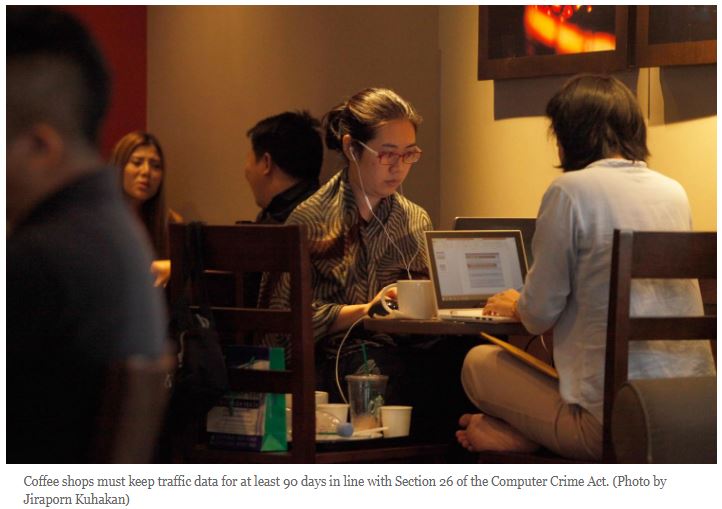Thailand: Digital Economy and Society Ministry’s WiFi demand draws flak
The Digital Economy and Society (DES) Ministry’s demand that all cafes store data passing through their WiFi connections has drawn flak from shop owners, especially small-scale operators, who said the measure would impose a financial burden on them, including server expense.
Digital Economy and Society Minister Buddhipongse Punnakanta said on Tuesday that coffee shops must keep the traffic data, known as a log file, for at least 90 days in line with Section 26 of the Computer Crime Act.
The move is meant to allow authorities to track down those behind illicit acts or remarks on the internet.
A company linked with PTT Plc, which owns Cafe Amazon, expressed worries about the cost of the measure.
“The business must spend more on a software system or technology to serve the government’s policy,” said Pongsak Tantikul, chief executive of PO Oil Co, a franchise trader of oil and gas under PTT. “We don’t know yet how much it will cost us, and the company is concerned about that.”
Small and medium-sized enterprises will be more affected by the policy than large firms, he said.
PO Oil operates eight petrol stations under the PTT brand.
An owner of the Roi 8 Coff coffee shop in Klong Toey district said that in order to comply with the law, a server must be acquired to keep the information.
When asked whether this would be an additional expense, the owner, who gave only his nickname Pong, said “absolutely”.
“If the government wants shops to store the information, they need to have a proxy server to store logs that can help identify who has used WiFi,” said Mr Pong, 41.
A PC that can run as a server could cost 20,000 baht, he said.
To follow through on the regulation, customers may have to fill out their information before logging onto WiFi at the shop. “This would surely burden customers,” Mr Pong said.
Forcing all shops to follow this policy would be difficult, he said: “Small shops would be in trouble.”
Mr Pong suggested the telecom operators step in to provide a solution to the issue.
Paiboon Amonpinyokeat, founder of the P&P law firm and an adviser to the DES Ministry, said coffee shops or internet cafes can just keep records on paper rather than using a server or data storage.
These shops can ask customers to write their names and ID numbers, along with the time and date they used WiFi, he said.
This information, coupled with CCTV footage at shops, can help track people who violate the act, said Mr Paiboon, who participated in the drafting of the Computer Crime Act.
“The intent of the law mandates that only large service operators, such as internet service providers and mobile operators, keep a log file in servers,” he said, adding that the law is not meant to put the burden on SMEs.
Mr Paiboon said that since the law came into force in 2007 and was amended in 2017, not a single case has been enforced under the legislation.
Criminals sometimes use public WiFi to commit offences, he said.
Mr Paiboon said the collection of personal data does not conflict with the Personal Data Protection Act, which is due to be enforced in May next year, one year after it was published in the Royal Gazette.
Source: https://www.bangkokpost.com/business/1767824/digital-economy-and-society-ministrys-wifi-demand-draws-flak


 English
English




